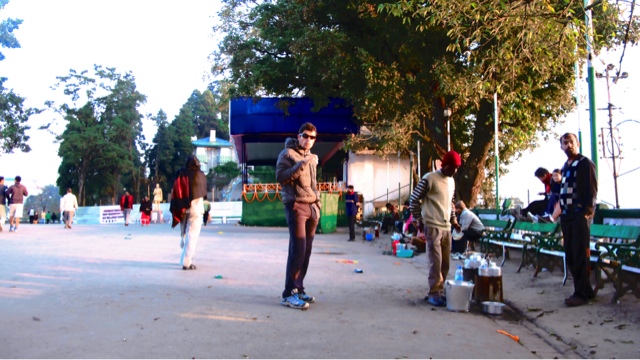It's 5.30am. It's not silent, but the usual cacophony of traffic, human bustle and barking dogs is for the time being peaceful, yet to stir. From below our hotel balcony the smooth chant of monks encourages the sun above the rim of the valley opposite. It's a stunning start to the day. Behind us, the cicadas make their monotonous din, birds wake with singing, and there's the slightly sleepy sounding voices of old men on the Square above us chatting about nothing in particular around a gas burner, which is heating water for their morning chai. As we leave the hotel to catch a glimpse of the mountains which we hope will be the backdrop to the next 6 days trekking, it's calm outside. Even the huge pack of dogs, heading towards where they reckon the best scraps can be found, are strangely quiet.
It's a different place to daytime India.
It is impossible not to get infuriated by the Indian propensity for tooting, although of course utterly futile. "I'm here"; "get out of my way"; "why won't the car 20 ahead of me just barge through the tragic so that I can reach my destination?"; "I'm here"; "thanks" (although that is rare. More often the toot is an admonishment, backed up in cases of extreme anger by a single flash of the headlights); "I'm here".
The tighter the street of course the more frantic, pointless and regular the tooting: "why are you, man with gas bottle, sack of rice, and 6x4 sheet of MDF on your back, in my way?" Of course there's no pavement. And in these confines, the effect is much louder; painful enough to ones ears in fact that on more than one occasion have I planned a dawn raid on every car in town to disconnect the offending instruments.
Traffic jams are the worst. Patience, good manners, and tolerance are not well drilled out here. In Darjeeling there's an added complication: the 'Toy Train'. This is the 19th century steam engine which hauls passengers to and from Darjeeling up to Ghoom, the highest station in India. It shuffles at walking pace up the narrow gauge track, billowing clouds of steam and smoke, much to the delight of the likes of us. The tracks are set into the road, and of course it has right of way...
Imagine the ire of the drivers in their jeeps, trucks, and cars, incensed by this constraint on their superiority as drivers. But, remember, they have seen this all before; at the same time every day. Yet still they fight this unassailable routine and sit frustrated and hooting in their cars until it passes. It's like telling the British public not to all try to get to the coast at 5pm on a bank holiday. The concepts of consequence and planning are a complete anathema to Indians, and so, day after day, they stand on their horns, and destroy yet further the tranquility of this beautiful place. Incredible.
In total opposition to this, the vendors in Darjeeling's congested market are taciturn. It is, again, a scene that would only happen here. The man selling fake Adidas socks has set up his stall, not as you might think at the other end of the market to the only other bloke selling fake Adidas socks, but instead within arm's reach of him. The same goes for the grocers, butchers, flip-flop wallers, all of them. It's an extraordinary and very vivid example of the totally illogical thought processes which the average Indian has. And there's no shouting each other down, no marketeering as you might expect in an English market. Oh no, they just sit next to vast stocks of unattractive goods, seemingly content to let the chap next to them, their competition, take the Rupees. The insight into the Indian condition continues.
Noise is often a term used in science to describe unwanted signal. It would appear that this description is equally apt out here.
Pictures:
Sunrise in Darjeeling. Peace.
Cup of tea in Chowrasta Square with the old chaps.
Trains. They really are that old!
The market...






Uncle Roger, they need you to help them with the train here! You wouldn't find this on one's Watercress Line in the heart of Hampshire!
ReplyDelete